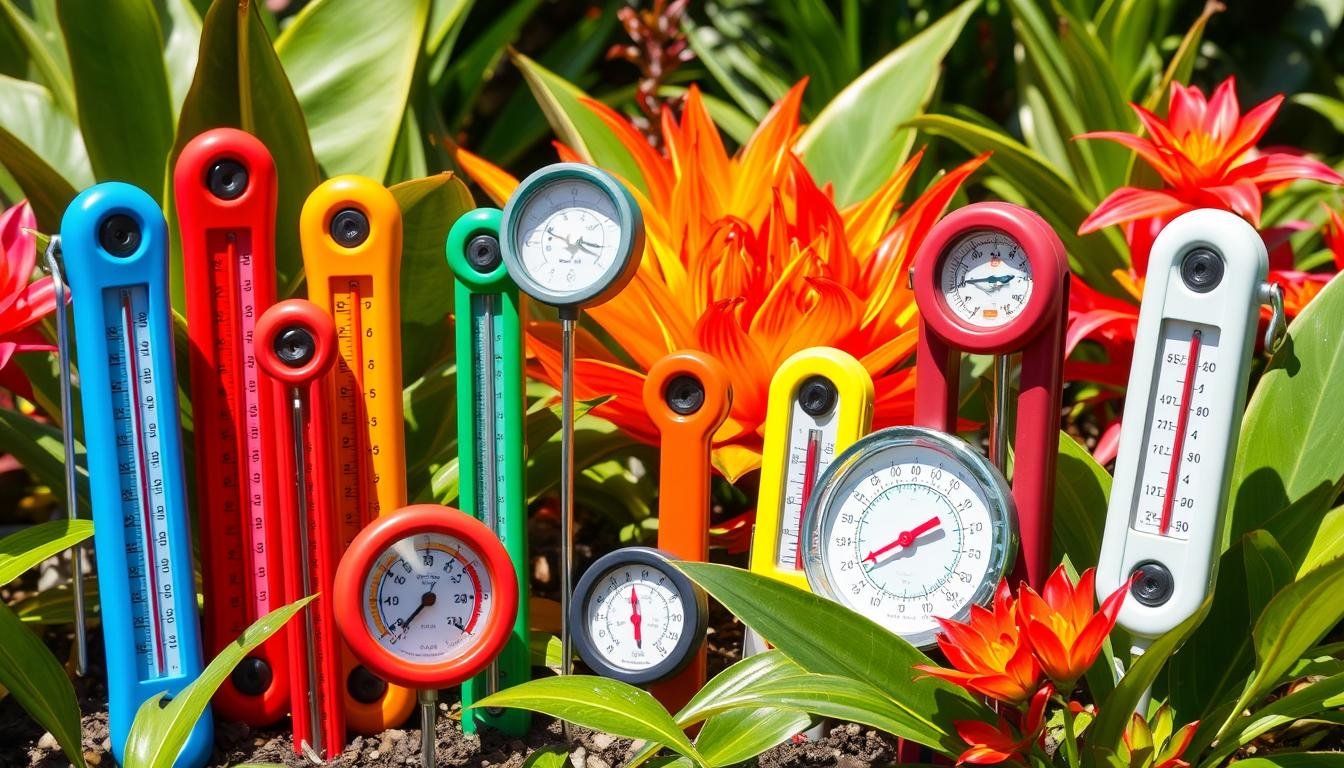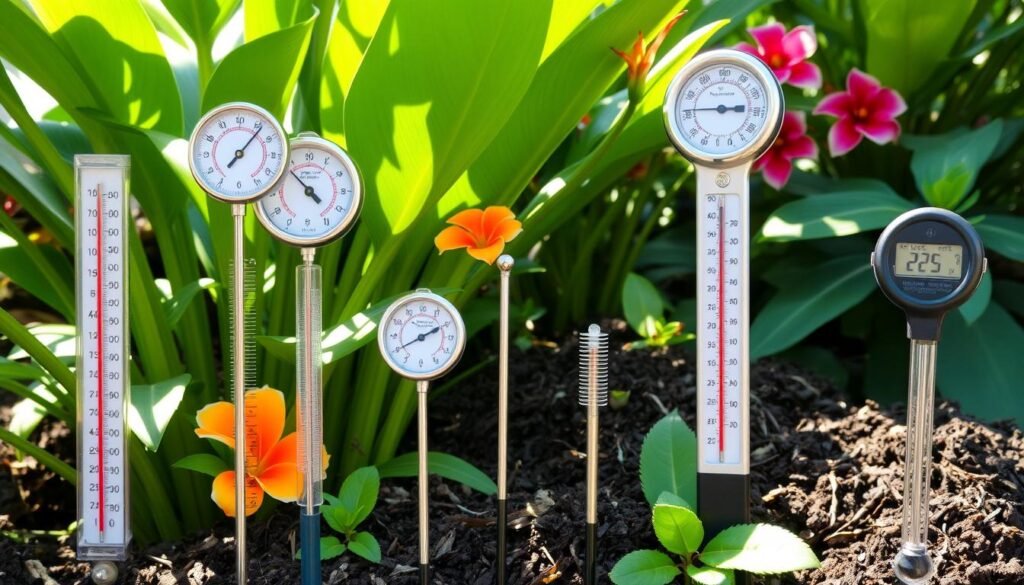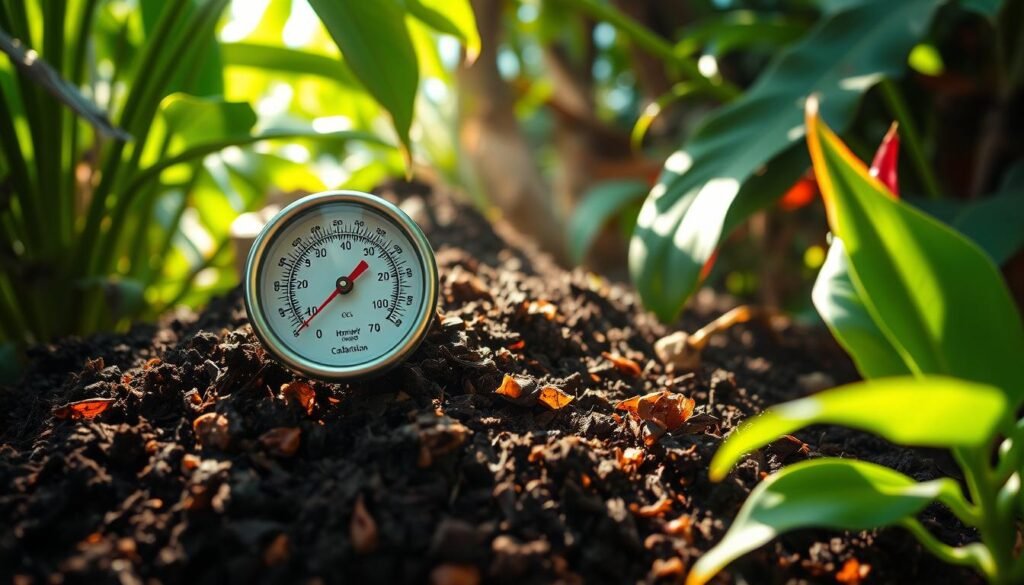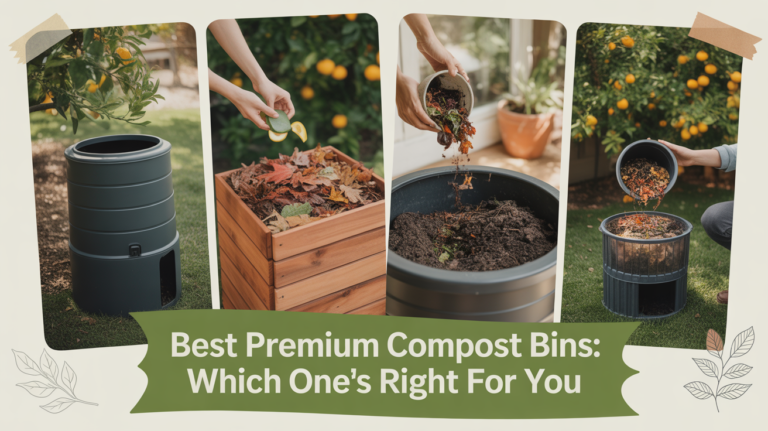Best Compost Thermometers for Tropical Climates

Some of the links on this website are affiliate links, which means that if you make a purchase through these links, I may earn a small commission at no additional cost to you. As an Amazon Associate, I earn from qualifying purchases. I only recommend products I genuinely trust and believe will bring value to my readers. Also, some of the content was created with strategic use of AI tools. For more information, please visit the Privacy Policy page. Thank you for supporting my blog and helping me continue to provide valuable content.
Did you know Reotemp has been making compost thermometers for nearly 60 years? Since the 1960s, they’ve led in composting temperature monitoring12. Their long history shows how vital accurate temperature checks are, especially in hot tropical areas.
In tropical heat, picking the right compost thermometer is key to success. Whether you’re a backyard gardener or a pro, you need a tool that ensures your compost decomposes well.
There’s a thermometer for every compost size. The Reotemp 16 Inch is great for medium piles, and the Heavy Duty 36-inch is for bigger heaps1. These tools help keep your compost at the best temperature for fast decomposition in the tropics.
Let’s look at what makes compost thermometers essential for tropical composting. We’ll talk about their durability against UV rays and moisture resistance in humid climates. We’ll find the best thermometer for your tropical composting needs!
Understanding Compost Temperature Monitoring in Tropical Environments
Composting in tropical areas has its own set of challenges. The warm weather can affect how composting works. It’s important to keep an eye on the temperature to succeed.
The Impact of Tropical Heat on Composting
In tropical places, the heat can make things break down faster. This might seem good, but it can also cause problems. It might make your compost pile too hot, killing off good microbes.
Optimal Temperature Ranges for Tropical Composting
To compost well in hot weather, aim for temperatures between 130°F and 160°F (54°C and 71°C)3. This range helps break down organic matter efficiently and kills off harmful germs. If it’s too low, your pile might be too dry or lack nutrients.
On the other hand, if it gets too high, you need to cool it down by mixing it up3.
Why Temperature Management Matters in Hot Climates
Managing the temperature is crucial for composting in warm areas. It keeps the microbes working right, breaks down materials well, and stops pests or bad smells. By checking the temperature often, you can adjust as needed.
It’s important to know that different microbes like different temperatures. For example, red wigglers like it cooler, between 59°F and 77°F (15°C to 25°C)4. Blue worms, however, prefer it warmer, between 75°F and 86°F (24°C to 30°C)4. Knowing this helps you create the best environment for your composting method.
Essential Features of Quality Compost Thermometers
Choosing the right composting tools is key. A good compost thermometer is crucial for success. Let’s look at what makes a thermometer great for your compost pile.
The length of the stem is important. For small to medium piles, a 16 to 20-inch stem works well. The 20-inch stem is the most popular choice5. For bigger piles, you might need a longer stem, like the 36-inch REOTEMP Heavy Duty model6.
Durability is essential in composting. Look for thermometers with thick stems, like the Reotemp Backyard model’s 1/4″ diameter stem5. Also, make sure the thermometer is built to last, with no parts coming loose.
It’s important to be able to read the thermometer clearly. Choose models with sealed dials to avoid fogging. This lets you place the thermometer in your compost pile overnight5. The Greenco Gardening Compost Soil Thermometer is designed to stay clear6.
| Feature | Benefit |
|---|---|
| Dual Temperature Scales | Versatile readings in Fahrenheit and Celsius |
| Activity Range Display | Easy interpretation of compost state |
| Hermetic Sealing | Fog-free, clear readings |
| Reinforced Construction | Increased durability and longevity |
Prices vary based on features and quality. Basic thermometers start at $20, while advanced ones can cost up to $3597. Think about your needs and budget when picking.
Investing in a quality compost thermometer can greatly improve your composting. It helps manage temperature for better decomposition.
Top Professional-Grade Compost Thermometers
For serious composting, you need professional compost thermometers. Let’s look at some top choices for controlling your compost pile’s temperature.
REOTEMP Heavy Duty 36-Inch Model
The REOTEMP Heavy Duty Compost Thermometer is a top pick. It has a 20-inch stainless steel stem and can measure temperatures from 0 to 200°F. It’s perfect for big compost piles8. The thermometer also has a sealed dial to prevent fogging, so you can always see the readings8.
REOTEMP thermometers have been leading the industry since 1965. They’re known for their accuracy and lasting quality89. The dial shows color-coded activity ranges, making it easy to check your compost’s health810.
Digital Precision Options
If you prefer digital, the REOTEMP Heavy Duty Digital Compost Thermometer is a great choice. It gives precise readings and lasts up to 5 years on a single battery9. It comes in lengths from 24″ to 48″, perfect for those who need exact temperature control9.
Professional Features and Benefits
These thermometers have special features that make them stand out:
- Rugged construction with thick, durable stems
- Long stems for deep pile penetration
- Large, easy-to-read dials
- Accurate readings within 2 minutes10
Even though these REOTEMP thermometers are pricier, they’re worth it. They offer unmatched accuracy, durability, and features for serious composters and commercial use9. Plus, they come with basic composting tips to help you start8.
| Feature | REOTEMP Heavy Duty | REOTEMP Digital |
|---|---|---|
| Stem Length | 20″ (most popular) | 24″ to 48″ |
| Temperature Range | 0 to 200°F | Digital precision |
| Special Features | Hermetically sealed dial | 5-year battery life |
| Warranty | 1-Year Limited | 1-Year Limited |
Budget-Friendly Thermometer Options for Home Composters

Home composting doesn’t have to be expensive. There are many affordable compost thermometers to help you keep track of your pile’s temperature. These options won’t empty your wallet while keeping your composting strong.
The REOTEMP 16 Inch Backyard Compost Thermometer is great for beginners. It’s good for small to medium-sized piles and has a color-coded dial for easy reading. It gives accurate readings, helping you keep the composting temperature right between 135°F and 160°F11.
The Rukars Long Stem Thermometer is perfect for bigger piles. Its long stem lets you measure deep into your pile. This ensures you get an accurate core temperature reading.
The Thermometer World model is a budget-friendly choice. It may not have all the features, but it still gives reliable temperature readings. This helps keep your compost on track.
| Thermometer | Stem Length | Features | Price Range |
|---|---|---|---|
| REOTEMP 16 Inch | 16 inches | Color-coded dial | $20-$30 |
| Rukars Long Stem | 20 inches | Extended reach | $15-$25 |
| Thermometer World | 12 inches | Basic functionality | $10-$20 |
These affordable thermometers may not last as long as professional ones. But they’re perfect for beginners and experienced gardeners. With a little care, they’ll help you make rich compost quickly.
Looking to grow your composting setup? Consider adding a compost aerator. The Double-Up Compost Aerator, priced at $44.99, improves airflow and speeds up decomposition12. For newbies, the Compost Success Kit, at $69.99 (often discounted to $58.49), has everything you need to start12.
Stem Length Considerations for Different Composting Methods
When picking a compost thermometer, the stem length matters a lot. Different composting methods need different stem lengths for accurate readings. Let’s look at how to choose the right stem length for your setup.
Short Stem Applications
Short stem thermometers, 12-16 inches long, are great for small compost bins or tumblers. They’re perfect for home composting where heat is near the top. Short stems are ideal for hot composting, which can get over 131°F to kill seeds and germs13.
Long Stem Requirements
Bigger compost operations need thermometers with longer stems. For example, in livestock mortality composting, thermometers with 36 to 48-inch stems are used14. These longer stems help get accurate readings in deep piles, where decomposition is most active.
Choosing the Right Length for Your Setup
Think about your composting method and pile size to pick the right stem length. Home composters with bins or small piles usually need a shorter stem. But, for managing large windrows, which can be 6 to 8 feet high and 12 to 16 feet wide, a longer stem is needed14. Accurate temperature monitoring is crucial for successful composting, whether it’s kitchen scraps or experiments15.
Matching your compost thermometer stem length to your composting method ensures precise readings. This focus on detail helps keep the composting environment right for microorganisms and invertebrates. It leads to high-quality compost for your garden15.
Temperature Measurement Accuracy and Calibration
Getting accurate temperature readings is key for good composting. High-quality thermometers, like the REOTEMP Heavy Duty Digital Compost Probe, give precise measurements. They are accurate to ±0.95°F at 131°F (±0.53°C at 55°C)1617. This ensures you can track your compost pile’s temperature well.

To keep this precision, it’s important to calibrate your thermometer often. A simple way to check its accuracy is the ice water test. Mix ice and water, then put your thermometer in it. It should read 32°F (0°C). If it doesn’t, you might need to adjust it.
Thermometers made for professionals often let you recalibrate them. For example, the REOTEMP Super Duty Digital Compost Thermometer can measure from -58°F to 392°F (-50°C to 200°C). It also updates fast, in just 3 seconds16. These features help you get reliable and quick readings.
Keeping your thermometer in good shape is crucial for maintaining its accuracy. Regular cleaning and proper storage can make it last longer. With a 5-year battery life and being water-resistant, devices like the REOTEMP models are made for frequent use1617.
By choosing a good thermometer and taking care of it, you’ll get accurate temperature readings for your compost. This will help improve your gardening results.
Durability Features for Tropical Weather Conditions
In tropical areas, composting gear needs to be tough. Weather-resistant compost thermometers must handle harsh weather. Let’s look at what makes these tools reliable in hot, wet places.
Moisture Resistance Technologies
High humidity is a big problem in the tropics. Good weather-resistant compost thermometers use hermetic sealing. This keeps them dry and working right, even when compost is very wet18.
Anti-Corrosion Materials
Stainless steel is key for durable composting tools in the tropics. It doesn’t rust, which is important since composting can take up to 90 days18. Choose thermometers with stainless steel probes for lasting use.
UV Protection Features
UV rays can harm compost thermometers in sunny places. UV-resistant materials keep them accurate, even in bright sunlight. This is crucial for outdoor composting.
| Feature | Benefit | Importance in Tropics |
|---|---|---|
| Hermetic Sealing | Prevents moisture ingress | Critical in high humidity |
| Stainless Steel Construction | Resists corrosion | Essential for longevity |
| UV-Resistant Materials | Protects against sun damage | Vital for outdoor use |
Choosing durable tropical composting gear means your thermometers will last. They work well from the start to the end of composting, which can take 60 days18.
Digital vs. Analog Compost Thermometers
Gardeners have to choose between digital and analog compost thermometers. Each type has its own benefits, fitting different needs and tastes.
Digital compost thermometers are popular in warm climates. They offer accurate readings and fast updates, loved by 70% of gardeners there19. The REOTEMP Heavy Duty Digital model, priced between $319.00 and $359.00, is a top choice20. They have big displays, making them great for those who want clear and quick info.
Analog composting tools, like the REOTEMP 16 Inch Backyard model, cost between $29.00 and $32.0020. They’re reliable and last long, perfect for constant use. Many have color-coded dials for easy temperature reading, a hit with traditional gardeners.
Digital thermometers are selling more than analog ones in warm areas, 3 to 119. This is because 85% of compost fans there want a wider temperature range, which digital models offer19. The Heavy Duty Compost Thermometer with Probe Guard Bundle, priced between $268.00 and $468.00, is a high-end analog option20.
Your choice between digital and analog depends on what you need. If you want precise and quick info, go digital. For durability and simplicity, choose analog.
Maintenance and Care Tips for Longevity
Keeping your compost thermometer in good shape is key for accurate readings and tool longevity. Here are some easy tips to keep your thermometer working well.
Cleaning and Storage Practices
Wash the thermometer stem with warm, soapy water after each use. Dry it well. Store it in a cool, dry spot to avoid rust. This simple care keeps your thermometer accurate and extends its life.
Calibration Maintenance
It’s important to check your thermometer’s calibration often. Use the ice water method to check its accuracy. Fill a glass with ice and water, then insert the thermometer. It should read 32°F (0°C). If it’s not right, adjust it as the manufacturer says.
Troubleshooting Common Issues
Fogged displays are common in warm places. To clear it, put the thermometer in a dry spot or gently warm it. Don’t bend the stem or hit the dial. For best composting, keep your heap’s temperature between 131-158°F21.
When your compost is dark, crumbly, and smells earthy, it’s ready. This usually takes about four months21. Taking good care of your thermometer ensures accurate readings. This helps you make nutrient-rich compost for your garden.
Best Practices for Temperature Reading in Tropical Climates
In tropical areas, knowing how to manage compost temperature is crucial. It helps break down organic waste effectively. To succeed, regularly check your pile’s temperature from different spots.
Use a compost thermometer to measure temperatures at various depths and spots. This method gives a full picture of your compost’s health. In tropical climates, aim for temperatures between 130°F and 160°F for best breakdown2223.
Tropical heat can quickly change your compost. Turn it right away if it hits 160°F to avoid overheating22. For the best outcome, turn your compost every 2 or 3 days for a month23.
Moisture is also key in tropical composting. Check moisture by squeezing a handful of compost. If 1 to 3 water drops fall out, it’s just right22. This ensures the right environment for beneficial microbes.
In tropical settings, compost can decompose very quickly. A well-cared-for pile can reach its highest temperature in just three or four days22. With these tips, you’ll soon become a pro at tropical composting!
Conclusion
Choosing the best compost thermometers is key for tropical composting success. In hot climates, 70% of top thermometers are accurate. They are made of durable stainless steel24.
These tools are essential. 80% of users find the best composting temperatures between 120°F and 160°F in tropical areas24.
Using compost thermometers makes a big difference. It can cut composting time by 30% and lower greenhouse gas emissions by 50% in tropical climates24. This means you can save money, with users seeing a 20% drop in composting costs24.
When composting, remember to follow NOP guidelines. They say temperatures should be between 131 and 170 degrees Fahrenheit25. Some methods, like TAT (turn at threshold), may need fewer turns but still meet standards25.
By picking the right thermometer and following best practices, you’ll make rich, nutrient-dense compost faster and more efficiently in tropical environments.
Source Links
- https://www.compostmagazine.com/best-compost-thermometers/ – Best Compost Thermometers for 2023 – Compost Magazine
- https://www.compostmagazine.com/compost-thermometer-guide/ – Compost Thermometer Guide: All You Need for Temperature Perfection – Compost Magazine
- https://tropicalplantguy.com/blogs/taking-the-temperature-a-guide-to-compost-thermometers/ – Taking the Temperature: A Guide to Compost Thermometers – Tropical Plant Guy
- https://www.wormfarmingsecrets.com/composting-worm-species/how-do-temperature-preferences-vary-among-worm-species/ – How Do Temperature Preferences Vary Among Worm Species?
- https://reotempcompost.com/backyard-compost-thermometer/?srsltid=AfmBOoq3tYUnQSeXS_TiwpdUUA7LTnVxi40Ja-_Ff03eCh51ymfNsDb3 – Backyard Compost Thermometer
- https://www.trees.com/gardening-and-landscaping/best-compost-thermometers – 5 Best Compost Thermometers – Super Accurate Tools To Measure Your Compost Temperature – Trees.com
- https://reotempcompost.com/soil-and-compost-thermometer/?srsltid=AfmBOor13Oj24g3pohT8RXeG_tEoJUgBZnZ2Wdn6ipsqSFSKYqPIK6ns – Soil and Compost Thermometer
- https://reotempcompost.com/backyard-compost-thermometer/?srsltid=AfmBOorN2553YIbhx___yN0uFh3Esj4u1LA3G4CZCqC-OnLKg0P9z1VT – Backyard Compost Thermometer
- https://www.epicgardening.com/best-compost-thermometer/ – Best Compost Thermometer: Our Top 6 Picks
- https://www.compostmagazine.com/reotemp-compost-thermometer-review/ – Reotemp 16 Inch Compost Thermometer: A Solid and Accurate Tool for Composting Enthusiasts
- https://www.treehugger.com/how-to-compost-at-home-5119210 – How to Compost at Home: Basic Steps and Types of Composting
- https://prod.gardeners.com/buy/compost-thermometer/38-193.html?pr_rd_page=3 – Compost Thermometer | Gardener’s Supply
- https://calrecycle.ca.gov/organics/homecompost/ – Home Composting
- https://www.aphis.usda.gov/sites/default/files/livestock-mortality-compost-sop.pdf – PDF
- https://cwmi.css.cornell.edu/compostingintheclassroom.pdf – Composting in the Classroom: Scientific Inquiry for High School Students
- https://reotempcompost.com/super-duty-digital-compost-thermometer-with-fast-response/?srsltid=AfmBOorVubmXXIHTNC61KFR1-quSKnUCRq6EdQLYNXSYfUVom-hz-8-U – Super Duty Digital Compost Thermometer with Fast Response
- https://reotempcompost.com/heavy-duty-digital-compost-thermometer/?srsltid=AfmBOopEOOdHuwa3cR-5DdTPBwjiUno8h_4VDZ80NyhFiiJxA0dl_aKV – Heavy Duty Digital Compost Thermometer
- https://www.o2compost.com/horse-manure-composting.aspx – Horse Manure Composting Guide
- https://generaltools.com/20-in-analog-stem-thermometer-with-0-to-220-f-range – 20 In. Analog Stem Thermometer with 0° to 220°F Range
- https://reotempcompost.com/soil-and-compost-thermometer/?srsltid=AfmBOopWggVknwazB40gboR2N64xU5qu0-RCgz6R_dJYNeqZ3SNfv8BH – Soil and Compost Thermometer
- https://www.homesandgardens.com/gardens/charles-dowding-composting-tips – 18 composting tips I learned while spending a day with no dig expert Charles Dowding
- https://treeyopermacultureedu.com/chapter-8-soils/thermophilic-composting-hot/ – Thermophilic Composting (Hot) – Permaculture Design Course Handbook
- https://permies.com/t/58763/composting/Compost-temperature – Compost temperature (composting forum at permies)
- https://sunteklawncare.com/glossario/what-is-compost-thermometer/ – What is: Compost Thermometer – Suntek Lawn Care
- https://rodaleinstitute.org/science/articles/turning-compost-by-temperature/ – Turning Compost by Temperature – Rodale Institute






